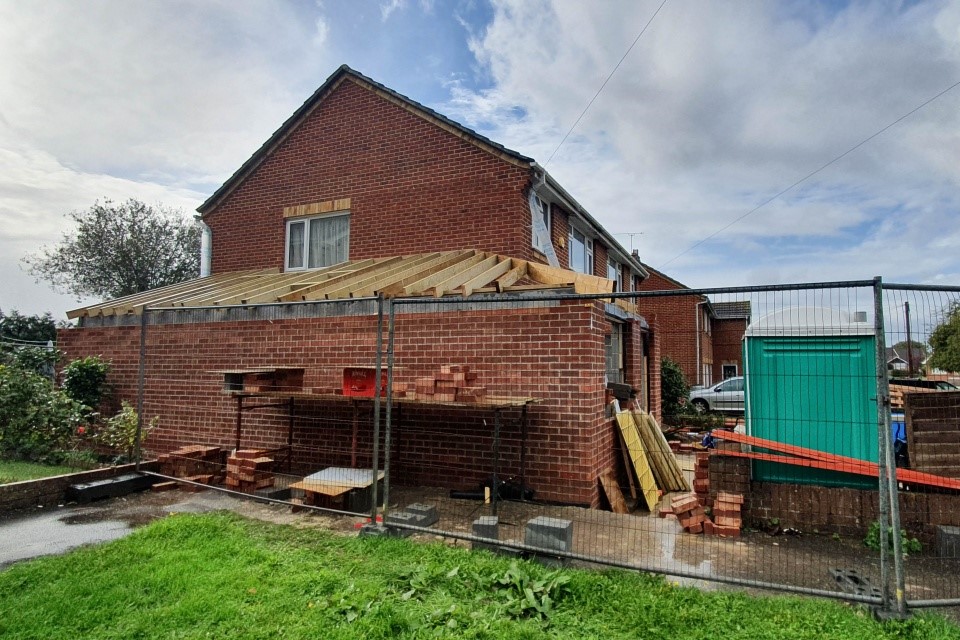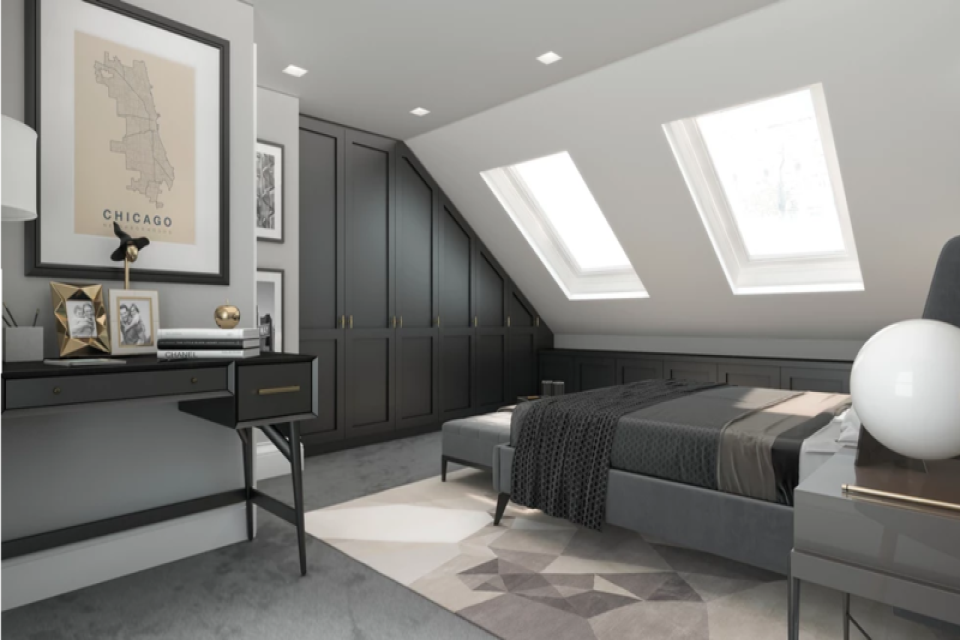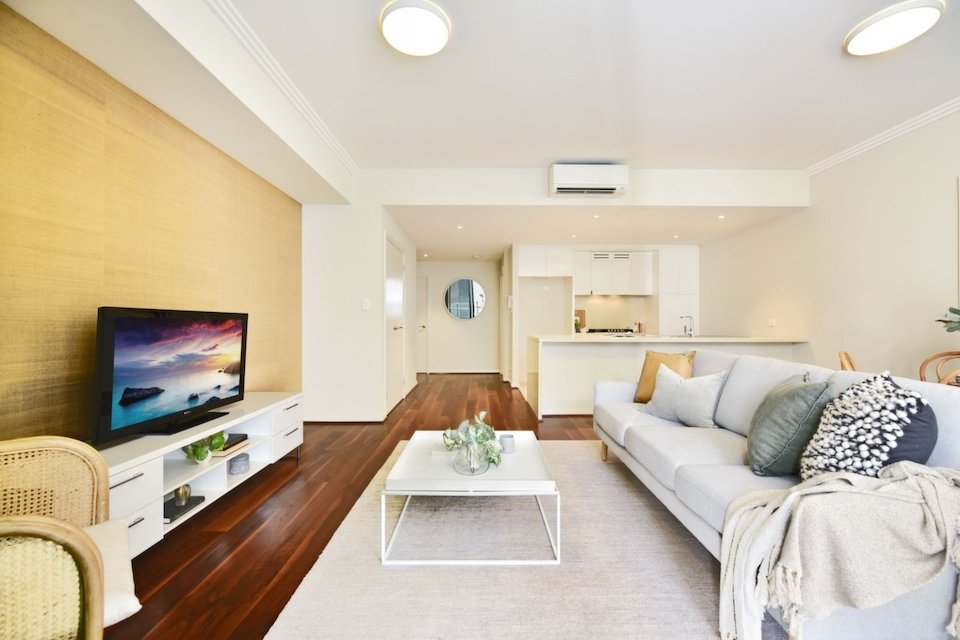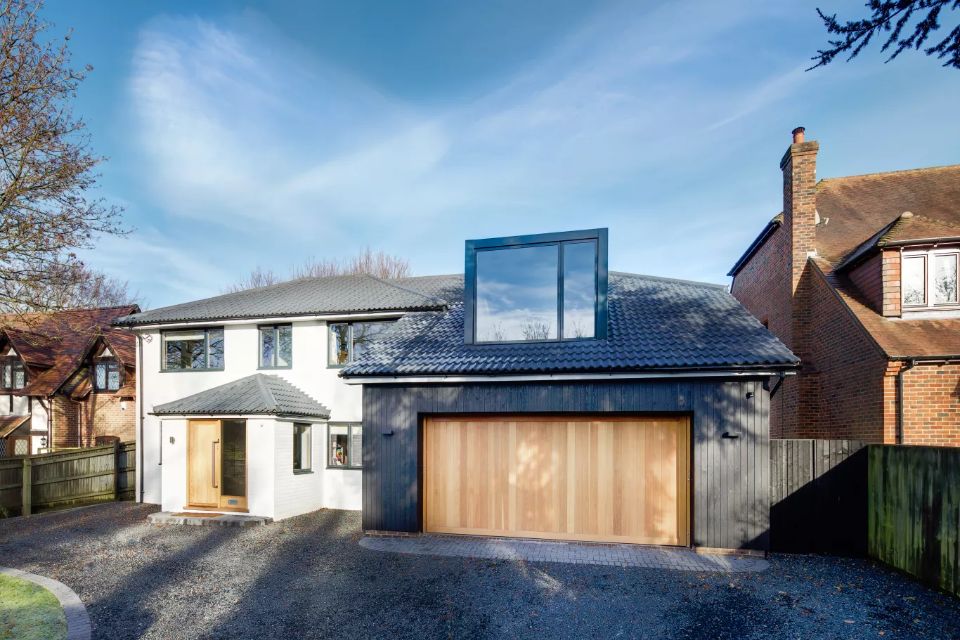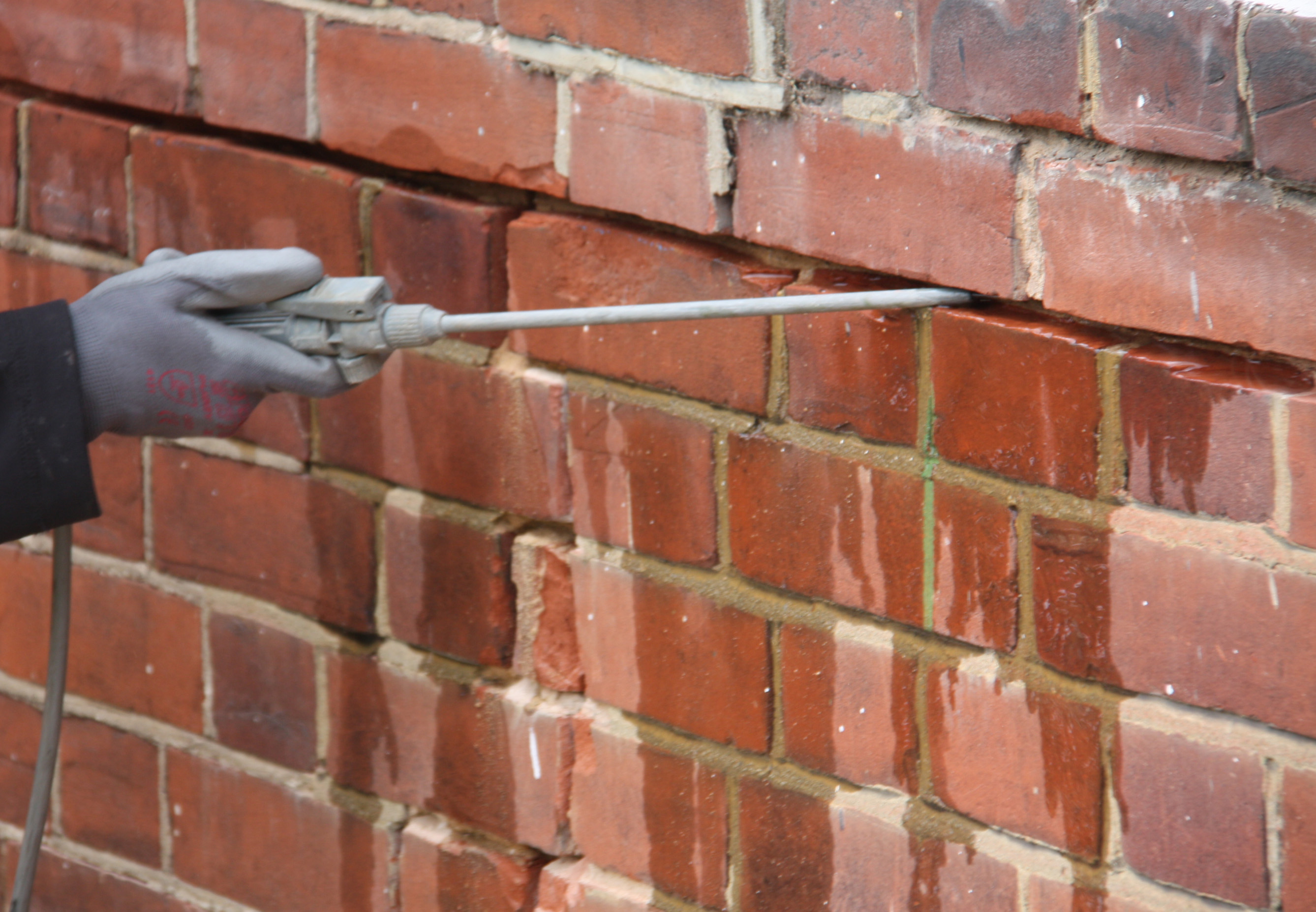How Much is an Extension in 2025?
Let's get straight to the point:
The average house extension cost is between £22,500 and £125,000.
This is quite a large price range, as the cost of an extension is dependent on the type of extension you choose to get, how much liveable space it adds, and the quality of the finish. The average costs can help potential homeowners understand the typical expenses associated with house extensions.
So let's break this down with some house extension cost examples:
Those based in the London area can expect higher labour costs, which impact the cost of extensions per m².
For instance, a single-storey extension would cost around £22,500 – £125,000. This type of extension is normally used for small additions, such as a bathroom or adding more space to a kitchen or living room. The construction cost represents a significant portion of the overall budget, so it's important to plan accordingly.
Now, that's still a huge price range, so let's break it down a bit more.
A small single-storey extension (15m²) has an average price range of £22,500 – £37,500, with the range mainly being affected by the quality of the finish and your location in the UK.
On the other hand, a large single-storey extension (50m²) can cost anywhere from £75,000 – £125,000.
The type of room that you are building and the finish can greatly impact the overall cost of your extension. Making your kitchen bigger or adding a new bathroom will lead to higher house extension costs.
What about the cost of a double storey extension?
Double storey extensions add extra liveable space over two floors — helping you to expand the space in both the downstairs and upstairs of your home. The cost of a double extension ranges from about £45,000 – £245,000.
Nailing down a specific price range for home extensions is challenging.
But stick with us: The rest of this guide will make everything a lot clearer and help you narrow down what you should budget for.
If you’re looking to get a more accurate price for a house extension of any type, we can help connect you with builders near you. Engaging the right professionals and accurately budgeting for your extension project is crucial to ensure everything runs smoothly.
- How Much is an Extension in 2025?
- House Extension Prices
- House Extension vs Other Additional Spaces
- What Additional House Extension Costs Should I Budget For?
- What are the Supply Costs of an Extension?
- Tradesmen Costs for an Extension
- How Long Does It Take to Build an Extension?
- How Much Does Each Stage of an Extension Cost?
- How Much Does an Extension Roof Cost?
- How Much Does Removing an Extension Cost?
- Why Add an Extension to Your Home?
- FAQs
- Sources
House Extension Prices
So, how much does an extension cost in the UK?
House extension costs vary significantly depending on the type of extension you get, the size of the extension, and the quality of the finish. The house extension drawings cost is an important factor to consider, as professional architectural designs are crucial for securing planning permission and complying with regulations.
For a semi detached house extension, costs typically range between £1,250 and £3,000 per square meter, and it's important to consider potential additional costs and time due to legal agreements like a party wall agreement.
Determining the size of the extension in square metres is essential for accurate budgeting, as the cost per square metre is a critical factor in planning a home extension.
Let's break it down a little.
Single-Storey Extension Cost
A single-storey extension is a popular house extension and is normally used to enhance the space of a kitchen or living room on the first floor of a property.
Single-storey extensions typically cost between £1,500 – £2,500 per m², depending on the finishes and complexities involved.
The table below sets out the single-storey extension cost for different sizes of basic, average, and premium quality builds.
| Size (m²) | Basic | Average | Premium |
|---|---|---|---|
| Small (15m²) | £26,250 | £31,500 | £37,500 |
| Medium (25m²) | £43,750 | £52,500 | £62,500 |
| Large (50m²) | £87,500 | £105,000 | £125,000 |
Double Storey Extension Cost
A double storey extension is built across two floors of a property. It allows you to significantly increase the liveable space available in your home with the addition of multiple rooms.
The average double storey extension costs between £1,500 – £2,450 per m².
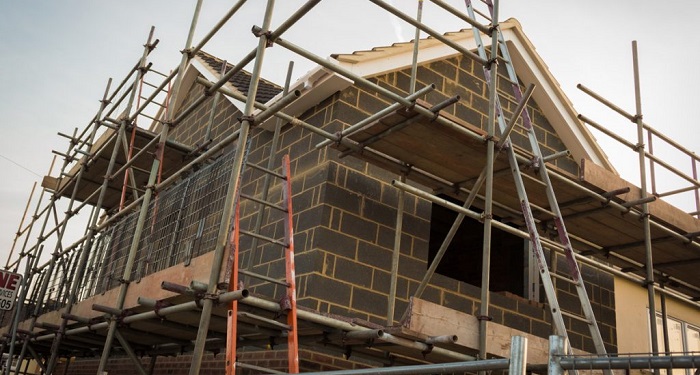
The following table lays out the costs for different sizes of double-storey extensions with varying quality finishes.
| Size (m²) | Basic | Average | Premium |
|---|---|---|---|
| Small (30m²) | £51,000 | £61,500 | £73,500 |
| Medium (60m²) | £102,000 | £123,000 | £147,000 |
| Large (100m²) | £170,000 | £205,000 | £245,000 |
Rear Extension Cost
A rear extension is installed at the back of a property where there is a large garden area.
The cost of a rear extension is around £1500 – £2500 per m².
The table below sets out the prices for different-sized basic, average, and premium rear extensions.
| Size (m²) | Basic | Average | Premium |
|---|---|---|---|
| Small (15m²) | £26,250 | £31,500 | £37,500 |
| Medium (25m²) | £43,750 | £52,500 | £62,500 |
| Large (50m²) | £87,500 | £105,000 | £125,000 |
Side Extension Cost
Side extensions are a popular choice for properties with a lot of space on the left or right-hand side of the home.
Typically, side extensions cost around £2,000 – £4,000 per m².
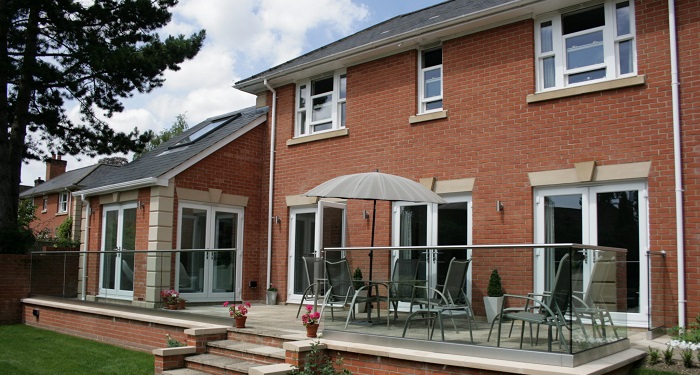
The following table shows the different-sized buildings for basic, average, and premium side extensions.
| Size (m²) | Basic | Average | Premium |
|---|---|---|---|
| Small (20m²) | £40,000 | £60,000 | £80,000 |
| Medium (40m²) | £80,000 | £120,000 | £160,000 |
| Large (60m²) | £120,000 | £180,000 | £240,000 |
Side-return Extension Cost
Properties with a small amount of space at the side of their home, which might be currently used to store bins and bikes, may benefit from a side return extension.
The price of a side-return extension is around £2,000 – £4,000 per m².
The table below sets out the different costs of basic, average, and premium side-return extensions.
| Size (m²) | Basic | Average | Premium |
|---|---|---|---|
| Small (6m²) | £12,000 | £18,000 | £24,000 |
| Medium (9m²) | £18,000 | £27,000 | £36,000 |
| Large (12m²) | £24,000 | £36,000 | £48,000 |
Kitchen Extension Cost
Want to have a larger kitchen in your home?
Your best option might be to have a kitchen extension.
Kitchen extension costs are about the same as a single-storey extension, at around £1,500 – £2,500 per square metre.
However, you should add an extra £200 – £1,000 per m² to account for the cost of a new kitchen.
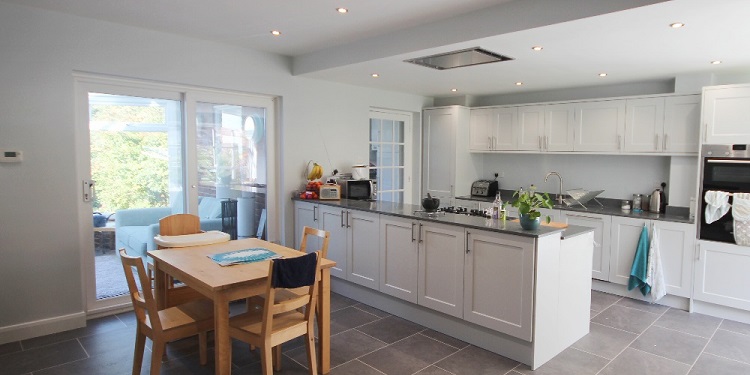
The table below sets out the costs for small, medium, and large kitchen extensions for various budgets.
| Size (m²) | Basic | Average | Premium |
|---|---|---|---|
| Small kitchen extension (6m²) | £14,450 | £17,400 | £26,900 |
| Medium kitchen extension (9m²) | £21,175 | £25,100 | £35,350 |
| Large kitchen extension (18m²) | £37,350 | £45,200 | £57,700 |
| Small kitchen suite (6m²) | £5,000 | £6,000 | £14,000 |
| Medium-sized kitchen suite (9m²) | £7,000 | £8,000 | £16,000 |
| Large kitchen suite (18m²) | £9,000 | £11,000 | £19,000 |
Bathroom Extension Cost
A bathroom extension is ideal if you only have one bathroom in your property or you want to have a bigger bathroom.
The cost of house extension installation with a bathroom is based on single-storey extension prices. This means that it costs about £1,500 – £2,500 per m².
You also need to consider new bathroom installation costs, which are around £300 – £3,000 per m².
The following table outlines the costs of installing different-sized bathroom extensions with varying qualities.
| Size (m²) | Basic | Average | Premium |
|---|---|---|---|
| Small bathroom extension (3m²) | £5,400 | £10,950 | £16,500 |
| Medium bathroom extension (6m²) | £10,8000 | £21,900 | £33,000 |
| Large bathroom extension (9m²) | £17,100 | £22,100 | £27,000 |
| Small bathroom suite (3m²) | £900 | £4,950 | £9,000 |
| Medium-sized bathroom suite (6m²) | £1,800 | £9,900 | £18,000 |
| Large bathroom suite (9m²) | £2,700 | £14,850 | £27,000 |
Porch Extension Cost
A porch extension is a great way to enhance the entrance of your home.
Not only can they boost the aesthetic appeal of your property, but they also provide you with extra liveable space (that's especially useful for storage) and can boost the energy efficiency of your home.
The average porch extension costs between £300 – £2,000 per m².
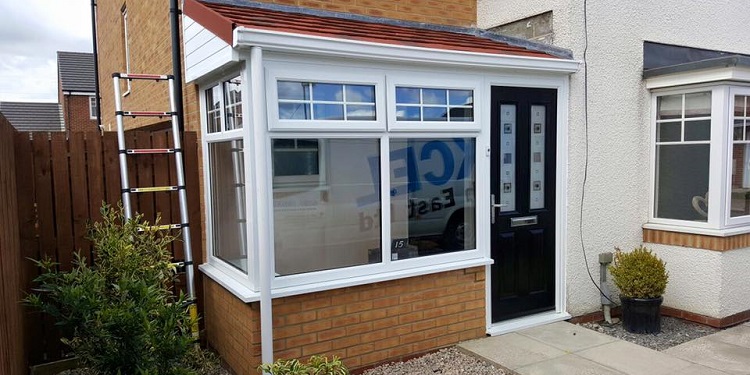
The following table highlights the prices for uPVC, wood, aluminium, and brick porch extensions.
| Size (m²) | uPVC | Wood | Aluminium | Brick |
|---|---|---|---|---|
| Small porch extension (3m²) | £1,500 | £2,700 | £6,000 | £6,000 |
| Medium porch extension (6m²) | £3,000 | £5,400 | £12,000 | £12,000 |
| Large porch extension (9m²) | £4,500 | £8,100 | £18,000 | £18,000 |
Prefab Extension Cost
On a tight budget?
If you don't have a huge budget, then a prefab extension may be your best option - as it will save on labour costs due to it being prefabricated before installation.
The average cost of a prefab extension is around £1200 – £1700 per m².
The below table sets out the costs for basic, average and premium prefab extensions.
| Size (m²) | Basic | Average | Premium |
|---|---|---|---|
| Small prefab extension (15m²) | £18,000 | £21,800 | £25,500 |
| Medium prefab extension (25m²) | £30,000 | £36,300 | £42,500 |
| Large prefab extension (35m²) | £42,000 | £50,800 | £59,500 |
Wrap-around Extension Cost
A wraparound extension is one of the largest extension types, which is normally attached to the rear and side of the home.
The average cost of a wrap-around extension is £2,000 – £4,000 per m².
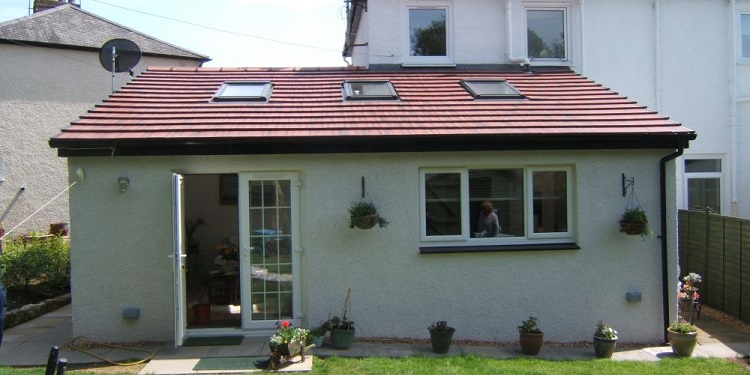
The table below shows the prices of different-sized wraparound extensions on a basic, average, and premium budget.
| Size (m²) | Basic | Average | Premium |
|---|---|---|---|
| Small wrap-around extension (20m²) | £40,000 | £60,000 | £80,000 |
| Medium wrap-around extension (40m²) | £80,000 | £120,000 | £160,000 |
| Large wrap-around extension (60m²) | £120,000 | £180,000 | £240,000 |
House Extension vs Other Additional Spaces
As previously mentioned at the start of this guide, the average house extension cost is between £22,500 – £125,000. However, below we take a look at how this compares to other add-ons available that can potentially increase the living and non-living areas of your property.
Below we have summarised the installation rates, before compiling a brief look at what's involved in each one.
| Project Type | Estimated Cost Range |
|---|---|
| Average House Extension | £22,500 – £125,000 |
| uPVC Conservatory | £13,950 – £26,650 |
| Aluminium Conservatory | £17,437 – £33,312 |
| Wood Conservatory | £20,950 – £39,975 |
| Concrete Garage | £4,000 – £10,000 |
| Garage Conversion (18m²) | £13,000 – £18,000 |
| Loft Conversion (20m²) | £10,000 – £25,000 |
| Brick-built Garden Office | £23,000 – £25,000 |
| Orangery (Mid-range, 25m²) | £25,000 – £30,000 |
| Basement Conversion (20m²) | £40,000 – £50,000 |
| Granny Annexe | £80,000 – £100,000 |
It is, however, worth noting each project comes with a different set of requirements. Whether that be the size of the build to the labour costs and how long each job takes to complete.
All of which can impact the final cost, including other factors such as location of your property, materials involved and any additional features that you may require.
Conservatory Costs
One of the most popular and often more affordable house extensions in the UK, is that of building a conservatory onto your property. The price can vary depending on the material, with the average costs outlined below:
- uPVC conservatory - £13,950 to £26,650
- Wood conservatory - £20,950 to £39,975
- Aluminium conservatory - £17,437 to £33,312
Garage Extension
Paying for an outbuilding such as a simple concrete garage can be yours for just £4,000 – £10,000, although as with almost all house extensions you still need to consider planning permission and any building regulations.
Garage Conversion
If you already have a garage, it may be you're not making the most of the additional space. After all, a single 18m² garage conversion can soon transform the space into something other than a place to store your car.
In fact, for an average of £13,000 – £18,000 the possibility are almost endless!
Loft Conversion
Again, instead of going down the route of a house extension, a loft conversion costs around £10,000 to £25,000.
There are other add-ons that will increase the cost, for example, if you wanted to trasform it into a more liveable space and install an ensuite bathroom or add extra head space.
Garden Office
While an outhouse is often built for many other uses, such as a bar or guest bedroom, creating a garden office has become increasingly popular and achievable (albeit at a cost of around £23,000 - £25,000).
Whether you're working at home or running a small business, it's a chance to seperate work from the rest of your homelife.
Orangery Extension
Similar to that of a conservatory, only an orangery provids more of an all-year-round living space.
With a mid-range orangery costing around £25,000-£30,000 (based on approximately 25m²) it can provide an area for entertaining, whether that's with the family or inviting guests round for dinner.
Granny Annexe
As one of the more expensive house extensions, costing on average £80,000 to £100,000, there's a lot that of work that goes into building a granny annexe.
In fact, once complete you will have a whole, self-contained, living area adjacent to the rest of your property. Often installed with all the facilities you'd expect to live a life seperate to the main household.
Basement Conversion
If you don't have the capacity for a house extension, then why not go down into a basement conversion instead?
It may come at a price, with a new 20m² basement potentially costing up to £40,000 to £50,000 but the end result will certainly be worth the price and is likely to increase the value of your home.
What Additional House Extension Costs Should I Budget For?
When planning an extension, especially for semi-detached or terraced houses, it’s important to consider requirements such as a party wall agreement, which can have an impact on both your timeline and overall costs.
Other potential expenses include planning permission fees, architect costs, and structural engineer fees.
Extension Architect Costs
Hiring an architect can help to design and plan your new extension, while also making sure that it's compliant with any relevant building regulations.
The cost to hire an architect is around £50 – £100 per hour.
Extensive Extension Groundwork Costs
Before building an extension, it is important that the ground is fully prepared.
This will ensure that the extension is installed on a robust foundation, while also preventing issues in the future.
If the existing ground is not level, then it may need to be excavated. This can cost around £30 – £50 per cubic metre.
Another extensive type of groundwork is installing drainage. This may involve removing old pipes and installing new pipework and drains so that your new extension has suitable drainage.
The cost to install new drainage is between £550 – £1,800.
Extension Planning Permission Costs
Prior to getting started on the building your extension, it is important that your plans align with planning permission regulations. This will help you avoid paying around £200 for an application.
To avoid incurring extra costs, you'll need to make sure that your extension meets the following criteria:
- The extension must not cover over half the property’s land.
- It must not exceed the highest point of the roof on the existing property.
- Extensions within two metres of the property’s edge should not have eaves that exceed a height of three metres.
- The work must not include installing raised platforms, balconies, chimney flues, vent pipes or any work to the roof (including cladding).
- Side extensions must be single-storey and cannot exceed four metres in height from the side elevation.
- Extensions on the side of a property must not exceed more than half the width of the building.
- Single-storey rear extensions must not extend more than four metres beyond the rear wall of a detached property or three metres for any other.
- Double-storey extensions must not extend over four metres from the back wall of the property and must not be within seven metres of a property boundary.
- The roof pitch of a double-storey extension must match the existing house as closely as possible.
- All windows on the top floor of a double-storey extension must be obscure-glazed if located on a side elevation.
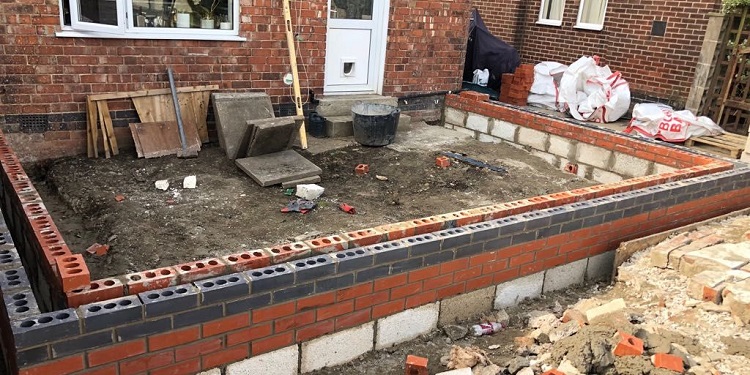
Extension Building Regulation Costs
The majority of house extensions do require building regulations approval before they can be constructed.
And what's this cost?
The cost of building regulations approval will vary depending on your local council, as all local authorities charge different amounts for building regulations approval.
There are various elements of an extension that must be signed off by a professional in order to deem the property safe.
This includes:
Internal and external walls
Flooring
Ventilation
Foundations
Some extensions require external walls to be built below ground level to ensure the superstructure (the extension) is supported properly.
The new walls that are built will make up the substructure, which normally includes blocks and mortar or brick. To ensure that the whole structure is protected, it is vital that the substructure is resistant to frost and substrates found in the ground.
To ensure that the flooring installed in your extension meets building regulations, it is important that it has a sound structure to support a significant amount of weight.
It should also be heat and moisture-resistant to insulate, ventilate, and protect the extension flooring from damp, weed growth, and contraction.
One of the most important elements you need to consider when installing a new extension is ventilation. This will improve the air quality in your home and promote better health.
To ventilate your property, you could simply install windows - especially in rooms with poor ventilation such as a bathroom. You can also install trickle ventilation in all the rooms of your home by applying it to window frames.
Before building an extension, it is important that there are robust foundations in place (which are normally made up of concrete).
The soil used should be able to hold the weight of the foundations and extension structure. It should also be dug deep enough to ensure that movement and contraction do not affect the extension. This is especially important for a double-storey extension, as more soil and foundations are required to support a larger extension.
What are the Supply Costs of an Extension?
Planning a DIY extension? Or do you just want to buy the supplies yourself?
In this case, you'll need to consider the following supply costs:
| Supply Description | Average Cost |
|---|---|
| Skirting board | £3 – £40 per m² |
| Plasterboard | £5 – £15 per m² |
| Wood flooring | £30 – £85 per m² |
| Laminate flooring | £10 – £55 per m² |
| Wall tiles | £12 – £160 per m² |
| Floor tiles | £15 – £50 per m² |
| Paint | £3 – £20 per litre |
| Plug sockets | £1 – £200 per socket |
| Light switches | £1 – £200 per switch |
| Radiators | £20 – £320 |
| Underfloor heating | £50 – £150 per m² |
| Internal doors | £90 – £750 |
| External doors | £120 – £4,000 |
| Windows | £200 – £3,000 |
| Door handles | £3 – £220 |
| Light fittings | £2 – £600 per light |
Tradesmen Costs for an Extension
When calculating the final cost of your house extension, you'll need to consider the labour costs charged by the various tradespeople that are likely to be working on your property.
Let's go through them now.
Extension Builder Cost
Builders have one of the most important jobs when constructing an extension.
They're involved in building the foundations and the actual structure of the extension to ensure it is robust and stable.
The average cost to hire a builder for your house extension is around £130 – £280 per day or £16 – £46 per hour.
Extension Plumber Cost
If building a kitchen or bathroom extension, you will need to hire a qualified plumber to install sinks, toilets, appliances, and more.
Plumbers cost around £200 – £400 per day for full bathroom installations or £30 – £60 an hour to plumb a sink.
Extension Electrician Cost
To get your extension fitted with lighting and electrical appliances, you will first need to hire a professional electrician to ensure everything is compliant and working properly.
The average hourly rate for an electrician is typically around £30 – £60 per hour or £170 – £340 a day.
Extension Plasterer Cost
To prepare your walls and ensure any paint or wallpaper lasts, you will need to hire an expert.
You should expect to pay £150 – £220 per day for a tradesman to plaster your new extension. They may only charge an hourly fee between £10 – £20 to re-plaster walls.
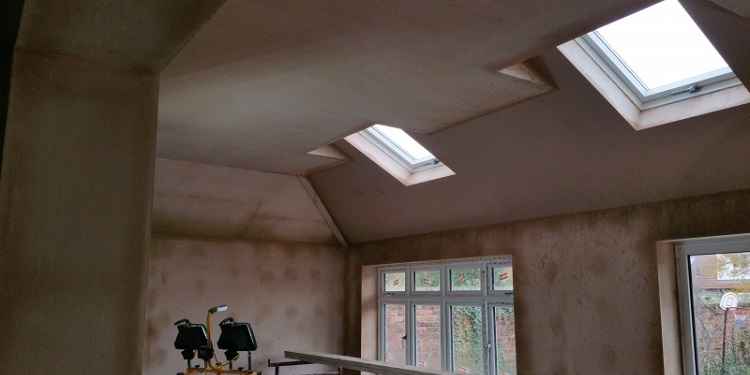
Extension Painter and Decorator Cost
Once the plastering is complete, you will need to bring in a decorator to paint or wallpaper the internal and external walls of your new house extension.
The average tradesperson will charge around £15 – £40 per hour to paint one or more walls.
For multiple rooms, you should expect to pay £100 – £300 a day.
Extension Carpenter Cost
If you're installing a new extension, you should hire a professional carpenter to help with the construction and installation of the new extension.
On average, a carpenter costs around £150 – £250 per day.
You may also want to hire them for smaller jobs - such as fitting a new door frame. In this case, they'll usually charge you an hourly rate of £20 – £40 an hour.
Extension Kitchen Fitter Cost
For a new kitchen extension, you should consider employing a kitchen fitter - who will install your kitchen cabinets and worktops.
For a small kitchen, you should expect to pay an hourly fee of £10 – £20, while a kitchen fitter charges between £120 – £200 per day for a large kitchen.
Extension Window Fitter Cost
Once your extension is built, you should hire a professional window fitter to install fully insulated windows.
For one or two windows, you should expect to pay around £25 – £35 an hour.
For a full set of windows on a double-storey extension, you'll likely be charged between £250 – £350 per day.
Extension Labourer Cost
Another important tradesperson you may need to hire is a labourer - who will assist with the majority of jobs onsite — including building foundations, the extension structure, and more.
The average day rate for a labourer is £100 – £160 a day or £7 – £15 per hour.
Extension Bricklayer Cost
To ensure your extension is built properly, you will need to hire experienced bricklayers who know what they're doing.
Typically, bricklayers charge around £130 – £180 a day for a large extension or £12 – £20 per hour for a porch extension.
How Long Does It Take to Build an Extension?
Building an extension can be quite time-consuming.
Because of this, it's important that you understand the timeframes involved in building the type of extension you want.
Here's a quick breakdown:
| Extension type | Duration |
|---|---|
| Single-storey extension | 2 – 3 months |
| Double-storey extension | 4 – 6 months |
| Side extension | 2 – 3 months |
| Side return extension | 1 – 2 months |
| Rear extension | 2 – 4 months |
| Wrap-around extension | 4 – 6 months |
| Kitchen extension | 2 – 6 months |
| Bathroom extension | 2 – 4 months |
| Prefab extension | 8 – 10 weeks |
| Porch extension | 3 – 14 days |
How Much Does Each Stage of an Extension Cost?
There are various stages involved in building an extension
Each of these stages has individual costs that you need to know about (and budget for).
Let's dive into them now.
Building Regulations & Design
So, what's first?
You'll need to start by ensuring that your extension design is compliant with current building regulations and planning permission rules.
But what if your current plans do not adhere to the conditions?
In that case, you will need to change your plans or pay around £200 or more to apply for your extension to be approved.
Once approval is obtained, then you can plan your extension in more detail.
For this, you'll need the help of an architect. Their main job is to draw up plans for the structure, which include the dimensions and the aesthetic of the extension, making sure that they adhere to the regulations.
Typically, an architect costs between £50 – £100 per hour.
Foundations and Groundworks
Before any building can begin, it is important that the ground is fully prepared.
This can be a costly process, as it involves excavation. This can cost from £30 – £50 per cubic metre, with the total cost being dependent on the size of the land you're working on.
You may also have to remove pipework and install new drainage. This will ensure that your extension is protected against flood and damage, while also ensuring water flow is running and connected to the main property (if it needs to be). This work tends to cost between £550 – £1,800.
Once all the groundwork is complete?
Only then can the foundations be set to provide a stable framework for the installation of the extension. Installing foundations is a time-consuming component of the project and will normally cost around £100 – £130 per cubic metre.
Building the Outer Shell
Once everything's prepped and the foundations are in place, what's next?
The next stage involves building the outer frames and walls - using timber, bricks, blocks, and tile materials.
The average price of an extension outer shell is around £800 – £1,600 per square metre for professionals to install a weatherproof extension shell.
Fixtures and Fittings
The last stage is all about the finishing touches.
This will include installing furniture (like kitchen cabinets and worktops), which will cost between £5,000 – £19,000.
For a bathroom extension, you should expect to pay around £900 – £27,000 for brand new bathroom fixtures.
At this stage, your windows and doors will also be installed. This costs around £250 – £1,200 per window, while door installation is typically priced at £50 – £120 per door.
You'll also want to fit indoor and outdoor light fixtures at this point, which normally amounts to £60 – £1,000 if fitted by a professional electrician.
How Much Does an Extension Roof Cost?
An important element of a house extension is the roof.
The cost of a new roof varies depending on the type that you choose to get installed.
Pitched roofs are the most popular type of extension roof, as they have good drainage and tend to blend in well with the aesthetic of most UK properties.
Let's take a look at your different options and their relevant costs now.
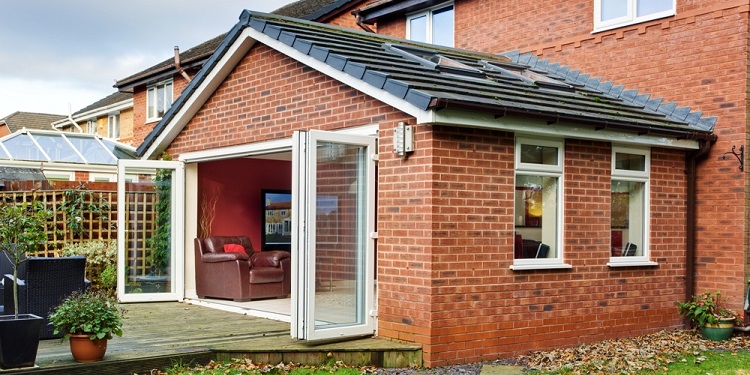
Duo-Pitched Extension Roof Cost
A duo-pitch roof (or a gabled roof) is a simple roof design which features two slopes which meet at a ridge.
Duo-pitch extension roofs tend to cost around £2,000 – £4,500.
Flat Extension Roof Cost
A flat roof is a type of roof that is almost completely flat except for a slight slope, which allows for drainage.
For smaller house extensions (like a single storey extension), flat roofs are becoming more popular — as they're affordable but also give a property a bit more of a modern look.
An average flat roof extension costs around £1,500 – £3,000.
Catslide Extension Roof Cost
A catslide roof is a type of pitched roof which slopes downwards further on one side than the other.
The average cost of a catslide roof is from around £1,200 per square metre.
Mono-Pitch Extension Roof Cost
A mono-pitch roof or a lean-to roof is a single-sloped roof. This continues to be one of the most affordable roof solutions.
The installation price for a mono-pitch extension roof is normally between £2,000 – £3,200.
Hipped Extension Roof Cost
A hipped roof has four sloped sides, which all have an equal length and meet at a central ridge.
The cost of a hipped extension roof is typically around £1,250 – £7,250.
How Much Does Removing an Extension Cost?
What about if you want to remove an old extension? How much should that cost you?
To ensure the extension is removed properly, you should consider hiring professionals. This will cost around £500 – £3,000.
On top of this, the cost of waste removal will be between £70 – £300.
Why Add an Extension to Your Home?
Increase Living Space
One of the most compelling reasons to add an extension to your home is the significant increase in living space it provides. Whether you need an extra bedroom, a larger kitchen, or a dedicated home office, an extension can help you create the space you need to live comfortably.
Considering the average cost of moving to a larger home ranges from £10,000 to £20,000, opting for a house extension can be a more cost-effective solution. By expanding your existing structure, you can enjoy the benefits of additional space without the hassle and expense of relocating.
Improve Quality of Life
An extension can also greatly enhance your quality of life by creating a more comfortable and functional living space. A well-designed extension can improve natural light and ventilation, making your home feel brighter and more welcoming.
Additionally, it can provide a dedicated area for hobbies or interests, such as a music room, home gym, or even a coy reading nook. By tailoring the extension to your specific needs, you can create a space that enhances your daily living experience.
Boost Property Value
Adding an extension to your home can also be a smart financial investment. According to a survey by the National Association of Estate Agents, a well-designed extension can increase the value of a property by up to 10%.
This is because an extension not only provides additional living space but also improves the overall appearance and functionality of the property. By making your home more appealing to potential buyers, you can enjoy a significant return on investment when it comes time to sell.
FAQs
Q: How close to my boundary can I build an extension?
A: If you're planning to build a double-storey extension, it should be no closer than seven metres from the boundary.
For any other type of extension that is within two metres of the boundary, it cannot exceed more than three metres of the existing property’s eaves.
Q: How much does a house extension add to the value of my home?
A: Adding an extension to your home can result in a return on investment of up to 25% for an additional bedroom and bathroom, while a bathroom extension can add up to 6% to the value of the property.
Q: What size extension can you build under permitted development?
A: If you want to save money on obtaining planning permission and building regulations approval, then you will need to build an extension that doesn't exceed permitted development limits.
If you’re planning to build a single-storey rear extension, then this should not exceed a depth of 3 – 4 metres. Other extensions can extend to 6 metres, and detached properties can even extend their home up to 8 metres.
Q: How deep does footing need to be for a single storey extension?
A: Single storey extension foundations must be at least 200mm deep to ensure that the structure is completely secure and robust.
Sources
- https://www.gov.uk/guidance/when-is-permission-required
- https://www.planningportal.co.uk/permission/common-projects/extensions/planning-permission
- https://www.planningportal.co.uk/permission/responsibilities/other-permissions-you-may-require/does-my-project-require-additional-consents
- https://www.nationwidehousepriceindex.co.uk/reports/dwd
- https://www.alanheathandsons.co.uk/bathrooms/long-take-install-bathroom/
- https://www.jtatkinson.co.uk/blog/a-step-by-step-guide-to-adding-an-extension-onto-your-home/
- https://www.designingbuildings.co.uk/wiki/Flat_roof

